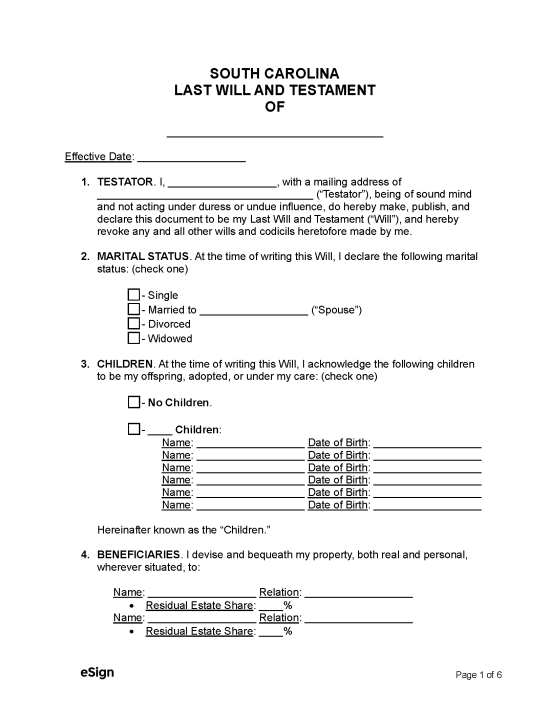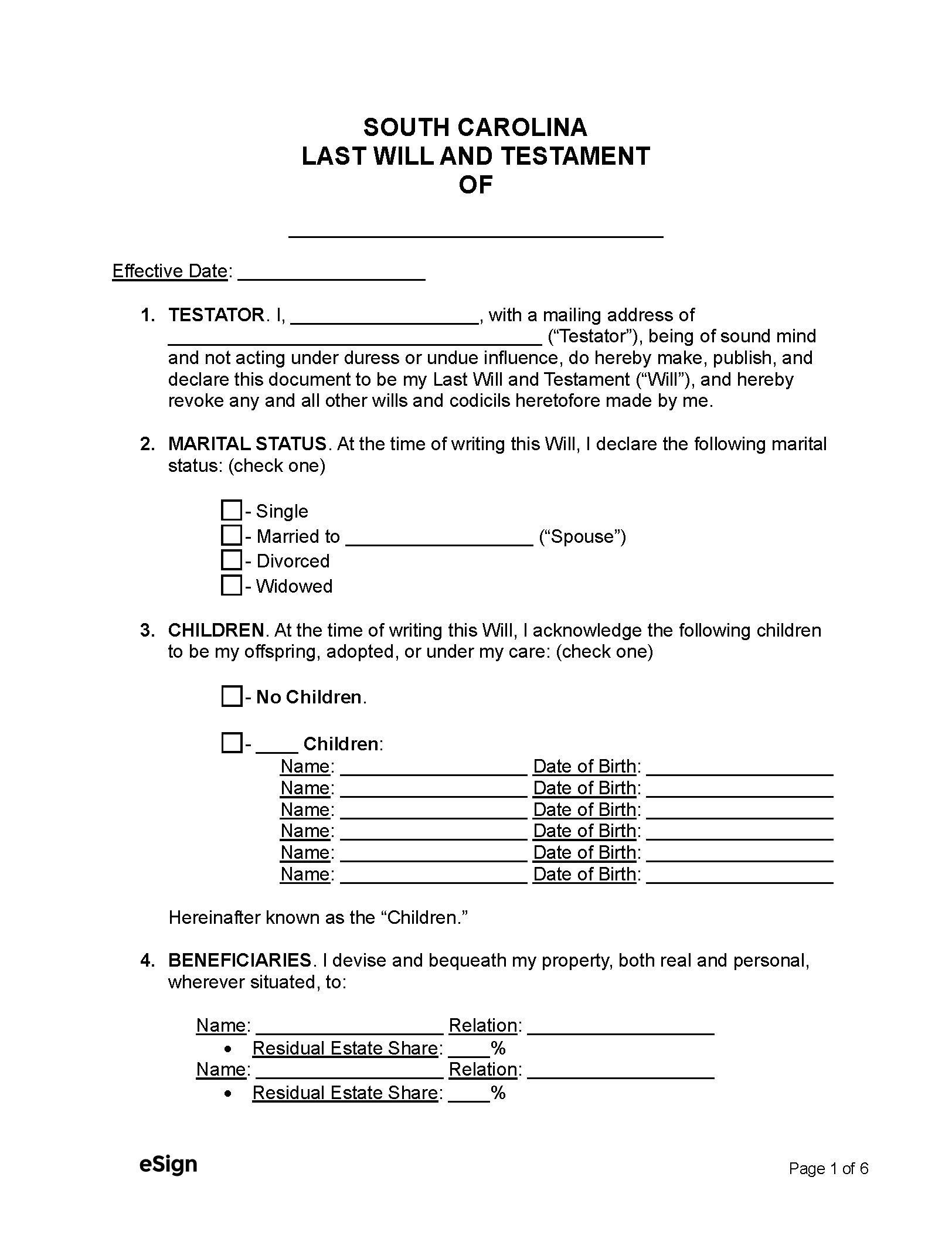State Laws
Any legal adult who is of sound mind may make a will.[1]
Holographic Wills – Holographic wills are not recognized in South Carolina.[2]
Revocation – Physically destroying the document or creating a new will shall revoke the original will.[3] If the testator is divorced or has their marriage annulled before death, any provisions in the will favoring the former spouse will become invalid.[4]
Signing Requirements – The testator and two witnesses must sign the will.
Probate Process in South Carolina (6 Steps)
Probate in South Carolina commonly takes eight months to two years to complete. The custodian of the will must provide it to either the personal representative named in the will or the local probate court judge within 30 days of the testator’s passing.[5]
- File Initial Forms
- Appoint Personal Representative
- Notify Heirs and Devisees
- Notify Creditors
- Prepare Inventory
- Settle Estate
- Close the Estate
1. File Initial Forms
For smaller estates valued at $45,000 or less, a Small Estate Affidavit may be filed to expedite probate proceedings.[6]
When filing for probate, an individual may opt for formal or informal proceedings. Formal probate occurs when there are anticipated disagreements and requires a hearing to prove the will. Informal probate is a more streamlined process and requires less court involvement. The informal method will be covered in this guide.
In addition to the will, the custodian (often the personal representative) must file the following:
- Application for Informal Probate of Will (Form 300ES) – The applicant submits this document to ask the court to appoint them as the estate’s personal representative and open informal probate. In addition to providing personal information and information regarding the decedent and their heirs, the applicant will need to sign the included sworn statement saying that, if appointed, they will perform their duties to the best of their ability.[7]
- Copy of the Death Certificate – This may be obtained via the Department of Health and Environmental Control website.
2. Appoint Personal Representative
If the court is satisfied with the submitted documents, it will approve the Application for Informal Probate with an Order of Informal Probate.[9] The court will also issue an Order of Informal Appointment, officially appointing the applicant as personal representative.
The court will give the personal representative authority to administer the estate by granting Fidicuary Letters (Form 140PC) (often called letters testamentary).[10]
The Order of Informal Appointment will state whether the personal representative must post bond prior to approval, though bond is often not required.[11]
3. Notify Heirs and Devisees
Within 30 days of appointment, the personal representative must send the Information to Heirs and Devisees (Form 305ES) to all heirs and devisees of the decedent to inform them that the will has been probated and the personal representative appointed.[12]
4. Notify Creditors
The personal representative must publish a Notice to Creditors (Form 370ES) once a week for three weeks in a row in a local newspaper.[13] Creditors will then have eight months to make a claim against the estate.
The personal representative may mail the Notice to Creditors directly to any creditor, requesting the creditor submit their claim within sixty days of the notice delivery date, or one year after the decedent’s death, whichever is earlier.
5. Prepare Inventory
Within 90 days of appointment, the personal representative must file an Inventory and Appraisement with the court, detailing what the decedent owned and its value at the time of their death.[14] A copy of the Inventory must be sent to any interested person who requests it, and a Proof of Delivery filed with the court.
Depending on the size of the estate, the personal representative may file a Long Form (LF) or Short Form (SF) inventory:
6. Settle Estate
The estate will remain open once the inventory is submitted until the creditor’s claim period ends. Before the personal representative can close the estate, they must settle all creditor claims and file the decedent’s final individual income tax returns with the IRS and the South Carolina Department of Revenue.[15] The personal representative may request a Certificate of Tax Compliance from the South Carolina Department of Revenue to submit to the court to prove that state taxes have been handled.[16]
A Federal Estate Tax Return may need to be filed for larger estates exceeding the federal filing threshold.[17]
Once all of the estate’s obligations and debts have been paid, the personal representative may distribute the remaining assets to the beneficiaries in accordance with the will.
7. Close the Estate
Within one year of publishing the Notice to Creditors or within 90 days of receiving a state or federal estate tax Closing Letter, the personal representative must close the estate by completing and filing with the court[18]:
- A full Accounting (Form 361ES) – Details how the estate’s assets were distributed during probate.
- A Proposal For Distribution (Form 410ES) – Describes any estate assets that have not yet been distributed.
- A Deed of Distribution (Form 400ES) – Releases any real property to the indicated heir or devisee.[19] This document must be filed with the local Register of Deeds, and a certified copy filed with the probate court.
- An Application for Settlement (Form 412ES) – Requests the court close the estate and discharge the personal representative.
Copies of the Proposal for Distribution, Accounting, and Application for Settlement must be sent to all heirs, beneficiaries, and unpaid creditors.
Each interested person must be sent a Notice of Right to Demand Hearing (Form 416ES) to inform them that they have 30 days to demand a hearing should they disagree with any closing documents.
The Receipt and Release with Waiver (Form 403ES) must be sent to each heir. This document certifies receipt of all assets given to heirs and devisees from the personal representative and releases them from liability.
The personal representative will file a Proof of Delivery with the court to show that they have delivered the required forms. Once the court is satisfied, they will issue a Certificate of Discharge to release the personal representative from their duties.

